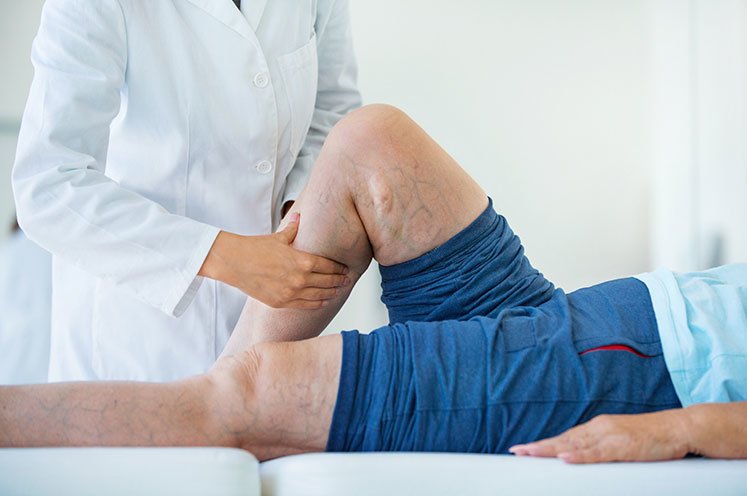Arrae Health: Primary Care Physician | Senior Health Services in Corona & Palm Springs

18 Apr, 2024
Demystifying Peripheral Vascular Disease: Symptoms, Diagnosis & Treatment
Millions of people around the world are affected by Peripheral Vascular Disease (PVD), a common circulatory condition. PVD takes place when there is a narrowing or blockage in the arteries that restricts blood flow to the legs and feet. PVD poses no threat to life, but when untreated may result in severe complications. This post provides information about eripheral vascular disease treatment including its symptoms, diagnosis and treatment options.
Understanding Peripheral Vascular Disease:
The major cause of PVD is atherosclerosis, which refers to the build up of fatty deposits in blood vessels. The legs have their blood vessels reduced by deposition of said fatty deposits in them, thereby reducing oxygen and food supply. Consequently, your leg muscles do not get enough resources for proper functioning.
Symptoms of PVD:
PVD often develops slowly. As a result, its symptoms may not become apparent at once. Some common signs include:
- Leg pain is the most common symptom, described as cramping, aching, or even burning sensations in the legs. This often becomes worse with physical activities such as walking and improves when one rests, for example, sitting or lying down.
- Numbness or tingling in the legs may occur during rest or activities.
- There is a change of color in the skin therefore, the skin on your legs and feet may appear pale or bluish due to reduced blood flow.
- Weakness of the leg muscles means that you might find it hard to walk or climb stairs.
- Slowly healing sores open wounds on the legs or feet may take a long time to heal or fail. In very severe cases, gangrene (tissue death) can develop.
Importance of Early Diagnosis:
Diagnosing PVD early is very important. If you experience any of the symptoms mentioned above, you should see your doctor immediately. Early detection allows for prompt intervention and prevents complications.
Diagnosing Peripheral Vascular Disease:
The doctor will perform a physical examination to determine how blood flows in your body and inquire about your health history and potential risk factors.
Several tests could be used to diagnose PVD, such as:
- Ankle-brachial index (ABI): The painless assessment calculates the blood pressure in your ankle and compares it with that of your arm. If the ankle pressure is lower than that of the arm, this can indicate possible PVD. Doppler ultrasound: This test involves using sound waves to visualize blood flow within arteries that are not invasive.
- Angiography: It is an X-ray technique where a contrast dye is injected into one’s arteries to reveal any blockages in them.
Treatment Options for Peripheral Vascular Disease:
PVD is an incurable condition, but thankfully, various PVD Treatment alternatives for peripheral vascular disease can help to control the disease and enhance blood flow:
- Lifestyle modifications: Enhancing blood flow and overall well-being can be achieved through quitting smoking, healthy dieting, keeping fit, and managing weight.
- Drug therapy: Your doctor may prescribe cholesterol-lowering drugs, antithrombotic agents, or antihypertensive drugs, depending on your requirements.
- Angioplasty: This procedure involves introducing a tiny balloon into the narrowed arteries to widen them.
- Bypass surgery: This is a surgical operation that creates an alternate route around blocked arteries by using a healthy vein from another place within your body.
Living with Peripheral Vascular Disease:
With the right management and treatment, most patients with PVD can lead long, healthy lives. The most important things are to follow professional advice from your healthcare provider, maintain good habits, and go for regular checkups.
Frequently Asked Questions:
- Am I in danger of Peripheral Vascular Disease?
If you have frequent smoking habits, high blood pressure, hyperlipidemia and a family history, you may be in danger of peripheral vascular disease. Can exercise help with PVD?
Yes, PVD can be mitigated by routine exercises, such as walking, because they improve blood flow remarkably and can effectively manage symptoms.
- What happen when Peripheral Vascular Disease is not treated?
When PVD goes untreated, it can cause severe ramifications such as leg pain becoming worse at rest (critical limb ischemia), non-healing ulcers, and even gangrene that may necessitate amputation.
2. Can lifestyle changes really impact Peripheral Vascular Disease?
Yes, lifestyle changes like quitting smoking, eating a healthy diet, exercising regularly, and managing weight can significantly improve PVD and overall vascular health.
Arrae Health: Your Partner in Effective Peripheral Vascular Disease Treatment
Living with PVD can be quite challenging. At Arrae Health our highly skilled healthcare providers are determined to give you comprehensive medical services. By integrating modern diagnostic techniques and treatment mechanisms grounded in proven evidence, our approach includes personalized care and support to allow you to cope with PVD effectively. Contact Arrae Health at 951-281-2730 to book your next appointment today.
